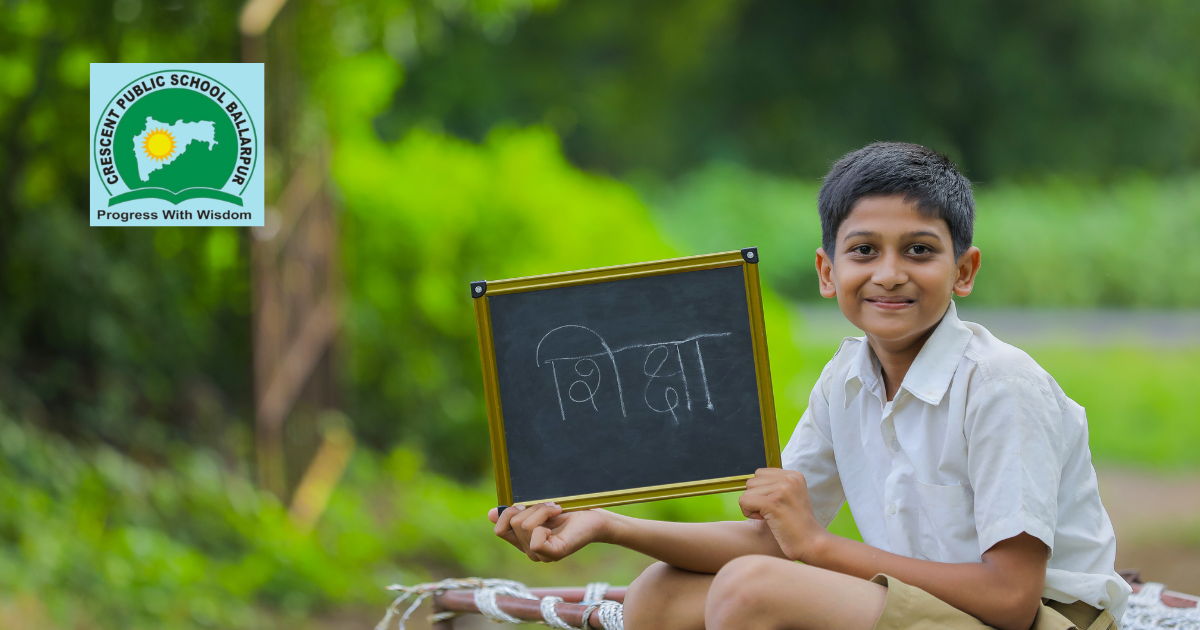“If you talk to a man in a language he understands, that goes to his head. If you talk to him in his mother tongue, that goes to his heart.” – Nelson Mandela
Dear Parents and Students,
Language is not just a tool for communication—it is the heartbeat of our identity, the melody of our culture, and the thread that binds generations. At Crescent Public School, Ballarpur, we understand that the journey of education begins in the warm familiarity of a child’s first language—their mother tongue.
In the dynamic world of today, where global languages often dominate classrooms, the value of a child’s native language must not be underestimated. The National Education Policy (NEP) 2020 has revived this vision, advocating for the use of mother tongues as mediums of instruction in early education. It’s a transformative shift—one that promises inclusive, equitable, and joyful learning.
The Emotional and Educational Power of the Mother Tongue
Every child’s learning journey begins at home, and the language spoken at home is often the first window to the world. When education begins in that same language, the child feels seen, heard, and valued.
According to UNESCO, children who receive their foundational education in their mother tongue are more likely to perform better in school, complete higher levels of education, and retain information longer. It’s not just about speaking—it’s about understanding. A concept taught in a known language becomes a life lesson; one taught in an unfamiliar tongue may just be memorized for an exam.
Studies in India have shown that children taught in their home language show higher confidence, greater participation, and deeper understanding. A World Bank report (2021) notes that using the mother tongue as a medium of instruction in early education can increase learning outcomes by up to 30%.
📚 NEP 2020: A Policy Rooted in Cultural Wisdom
The National Education Policy 2020 recognizes the significance of linguistic identity. Its approach is both progressive and deeply rooted in India’s multilingual heritage. The NEP emphasizes:
* Education in the Mother Tongue or Regional Language till at least Grade 5, and preferably up to Grade 8.
* Multilingualism to be encouraged in schools through the *Three-Language Formula*.
* Inclusion of Local Context and Culture in the curriculum to make learning more relatable.
* Availability of Textbooks and Teaching Materials in local languages to support effective implementation.
The aim is to make education child-centered, not language-centered—empowering students to think, reason, and express themselves comfortably and creatively.
Real-Life Impact: Lessons from the Ground
Let’s take the example of Odisha, where the government implemented multilingual education in tribal districts. By introducing textbooks and teaching in the tribal students’ own languages—Koya, Kui, and Saora—the dropout rate dropped by 24% over three years. Parents, once hesitant to send their children to school, felt a new sense of belonging and pride in education.
Similarly, in Maharashtra’s Gadchiroli district, where Gondi was introduced in early classes, children began participating more actively. Teachers observed a significant boost in their enthusiasm and curiosity.
These are not just statistics—they are stories of transformation, dignity, and empowerment.
At Crescent Public School, Ballarpur: Our Vision Forward
We at Crescent Public School stand firmly behind the NEP’s vision. We believe that learning should not alienate a child from their roots—it should strengthen their sense of identity while preparing them for the global stage.
Here is what we are doing:
* Inclusive Classrooms: Teachers are being trained to incorporate bilingual methods and local examples in early classes.
* Parental Involvement: We encourage parents to read, speak, and narrate stories in their home languages to nurture early literacy.
* Resource Development: Efforts are underway to include local culture and vocabulary in learning materials.
* Language Respect: Every language spoken by our students is respected and acknowledged in our classrooms.
English and other global languages are essential in today’s interconnected world. But they are best learned when the child already has a strong foundation—built in the comforting, familiar rhythms of the mother tongue.
A Call to Parents: Language is a Gift—Pass it On
Dear parents, you are your child’s first teacher. Speak to them in your native language. Share folktales, sing lullabies, teach them local idioms and expressions. These are treasures that no textbook can offer. By doing so, you are not only strengthening their vocabulary—you are giving them a sense of pride, history, and belonging.
When children are proud of who they are and where they come from, they walk into the world with confidence. They may learn English to compete, but they need their mother tongue to connect—with their roots, with others, and with themselves.
In Conclusion: Education Rooted in the Heart
Let us not see language as a barrier, but as a bridge. A bridge that connects generations, that carries culture, and that lays the path for confident learning. NEP 2020 is not merely a policy—it is a reminder that in diversity lies our strength.
At Crescent Public School, we are not just teaching subjects—we are nurturing souls. And every soul begins its journey in the language of its heart.
Let’s build a future where every child learns freely, confidently, and joyfully—starting with the words they first learned to speak.
Warm regards,
Principal
Crescent Public School, Ballarpur




